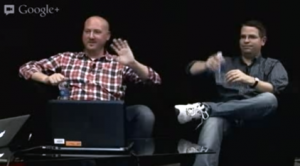 At SMX West today we were invited to walk a mile in Google’s shoes, as Matt Cutts with Patrick Thomas of the Search Quality Team led us through the kinds of dilemmas a search engine faces regularly in deciding when, and when not, to censor results.
At SMX West today we were invited to walk a mile in Google’s shoes, as Matt Cutts with Patrick Thomas of the Search Quality Team led us through the kinds of dilemmas a search engine faces regularly in deciding when, and when not, to censor results.
Should Google censor content? 3 people in the audience raised their hands for “yes.” Should Google show child porn? Tougher call for those who support “no censorship!” Matt and Patrick then led us through some examples of the kinds of tough calls search engines need to make.
Example: What would you do? A woman publishes a suicide note on her web site. It shows up as a top result for her name. The family asks for it to be taken down. (Matt Cutts: “It’s actually a really well-written suicide note” – facepalm moment!). Audience was split about half on whether they would take the page down.
Some of Google’s principles:
- Fast acces to information
- Algorithmic solutions are preferable
- Don’t push shocking or offensive content at users unless they have asked for it.
- Help users avoid fraud and identity theft, like removing bank account numbers published (upon request)
- Google’s interactive story: How Search Works
Matt: If you really want porn, we say, “Here it cums! In your face!” (Facepalm moment #2!)
Violent or Shocking Content: Where to Draw the Line?
- Thinspiration pro-anorexia
- War footage
Safe Search is a way to leave it to the user. But the problem remains: what goes in safe search? Perhaps they will add more user “switches.” But some graphic material has redeeming qualities, so hard to automate.
Dealing with Disputed Facts
With things like Knowledge Graph they try to go out of their way to verify sources of information. But can’t verify everything. Google “Google Maps border dispute” for an example of a tough situation.
Vietnam says Ho Chi Minh had no wife. But Google has sources that have a photo of her. Vietnam threatens to jail Google personell if it isn’t taken down. What would you do?
Hate Speech?
A top result for Martin Luther King was martinlutherking.org which ranked high because it had tons of great links from teachers who didn’t check it. It was actually a hate site against MLK.
Another example is vaccines. People against them talk a lot more about it, so they might rank better.
Autocomplete search suggestions: “americans are…” brings up a lot of negative results. This simply shows the state of the web, not Google’s opinion. Danny Sullivan suggested that they just eliminate negative suggestions. Matt responded with is “Danny Sullivan is gay” negative? How about “Danny Sullivan is Jewish”? Not always easy to determine what is negative, or negatives are different for different people.
Personally Identifiable Information
Search for “ex girlfriend pics” showed a site with such photos as top result. Someone might spot a picture of themselves and request for it to be taken down.
Also people should remember that taking something out of Google doesn’t take it off the web.
Eric Schmidt (former CEO of Google) asked for his house address to be taken off Google Maps, and Google said no.
What if a photo is fake and is being used to defame someone? The Supreme Court ruled that simulated child porn is protected because it doesn’t defame an actual person. Google did take action when a person posted something that went viral and then later admitted it was faked.
If you get rid of all the suggestions that might be negative, what are you left with? Might make auto-suggest less useful. Therefore Google has erred on a light touch with censoring.
There is way more internal debate at Google, and encouraged pushback at the top execs, than anyone on the outside knows. And those debates have influenced policy. Much happens on Google’s own internal Google+ network.
What about a brand getting unfairly pegged as “scam” or worse in autosuggest for their brand name? A lot of people search “[brand name] scam” to find out if the brand is a scam.
Conclusion: The suicide note. After the session, the majority for “leave it up” grew slightly. If the site owner removes the page and repings Google, they will re-crawl and it will be gone.
Here’s the Google+ Hangout video of this session:
